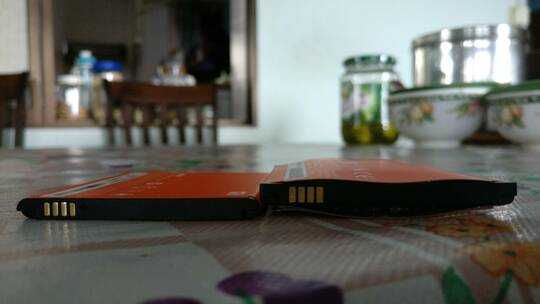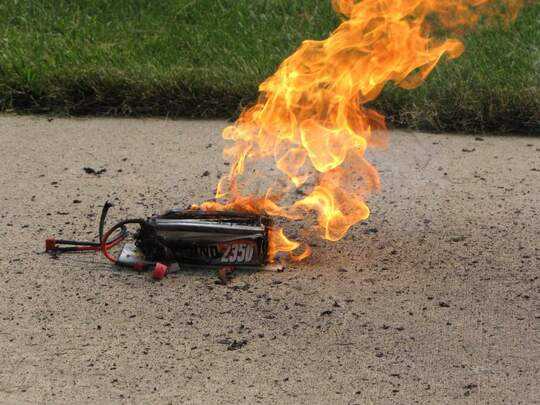
I had this happen, and I had to store it till I had time to drop by a designated ewaste centre which specifically accepted lithium ion batteries. (This is important. Throwing potentially inflammable materials in regular trash is bad. Only you can stop fires)
There's likely no need to panic if it's a week or two.
You want to store it for as short a time as possible. For most part, unless you stab it, an unused bloated battery ought to be reasonably safe. Practically you want to leave it somewhere cool and dry - so a fridge isn't the best place. The fridge trick is used for dying batteries in some cases, not dead ones.
I'd suggest taping over the connectors to prevent accidental shorting and just leaving it somewhere non inflammable.
Freezing doesn't sound bad until you realise you need to take it out there's a sudden change in temperature (potentially bad) condensation (see moisture).
It's also worth considering this had happened over a course of weeks or months before it got noticeable - there was some pressure on the screen and I'd assumed it was an air bubble the screen protector, and I'd noticed the bloating entirely by accident, so short of baking (advertantly or otherwise), burning or stabbing your battery, or taking a few months to do it, you probably don't need to massively baby the battery. Just don't charge it (and for once self discharge is fine). A battery not in use is slightly less likely to spontaneously catch fire.
There're a few suggestions I've seen online - like putting the battery in salty water (which sounds like a terrible idea, especially since lithium reacts violently with water, and is a potential source of bloating anyway) or trying to discharge the battery (energy flow could mean heat could mean fire). The MSDS backs this up, suggesting that the electrolyte reacts with water to form HF (which is nasty) and the anode with h2. And many other scary things.
So leave it alone, keep an eye on it, and avoid viking funerals and you should be fine.


28Your best solution is to put the battery in a fireproof container. A battery like this is a potential fire hazard and should be isolated to prevent property damage in the event it does catch fire. RC folks use fireproof charging bags to protect against these types of situations. – bwDraco – 2016-07-23T10:38:00.157
It's currently sitting in a ceramic cup, on a table with ceramic tiles as I'm aware of the potential risk of it to catch fire. I was just wondering if I could lower that risk by freezing it as well. It'll be a week or two before I can get around to get to a disposal site for it. – A.Grandt – 2016-07-23T10:40:39.520
7No, don't freeze it. Last thing you need is more crystalisation inside the battery. – Bob – 2016-07-23T10:47:10.067
2I removed the phone reference as phones are technically off topic for Super User. This condition can affect any pouch LiPo or prismatic Li-ion battery; most thin-and-light laptops use pouch LiPo batteries and can be affected by the same issue, so this question can certainly extend to computer hardware. – bwDraco – 2016-07-23T12:17:28.763
5One of many videos of LiPo/LiIon batteries exploding, via EE.SE. – Ben N – 2016-07-23T16:24:49.073
10When my wife brought home her mangled laptop and high-capacity battery after it was run over by a car (don't ask), I stored the battery in the BBQ grill outside until I could take it to be disposed the next week (in a metal bucket in the back of the pickup). Probably overkill, but LiIon batteries can have spectacular catastrophic failures. Not sure what I would have done if it had exploded in the grill, guess I would have come here asking if the grill was still safe to use for cooking food... :) – Johnny – 2016-07-23T21:50:55.967
2Metal bucket or cooking pot (lid on?) may be a good idea. – JimmyB – 2016-07-25T14:26:29.463
1The table might not be enough - when the catastrophic failure occurs, the battery can spew flaming debris all around the room. Those things are really dangerous :/ – Luaan – 2016-07-25T15:32:24.377